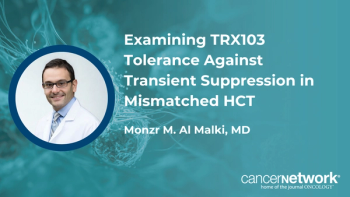
Brentuximab Vedotin Combo Earns European Approval in Hodgkin Lymphoma
Data from the phase 3 ECHELON-1 trial support the European Commission’s approval of brentuximab vedotin plus chemotherapy as a treatment for those with CD30-positive stage III Hodgkin lymphoma.
The European Commission has granted approval to brentuximab vedotin (Adcetris) plus doxorubicin (Adriamycin), vinblastine, and dacarbazine (AVD) for adult patients with previously untreated CD30-positive stage III Hodgkin lymphoma, according to a news release from Takeda.1
Supporting data for the European approval came from the
Treatment with brentuximab vedotin in the ECHELON-1 trial raised no new safety signals.
“ECHELON-1 is the first trial to show a statistically significant improvement in [OS] outcomes for adult patients with stage III and IV Hodgkin lymphoma in two decades, demonstrating the benefit [brentuximab vedotin] continues to bring to a broad group of patients,” lead investigator John Radford, MD, FMedSci, a professor of medical oncology at the University of Manchester and the Christine NHS Foundation, said in the news release.1 “This approval is an exciting advancement in care, allowing even more [patients with] lymphoma to access the proven efficacy, consistent safety, and tolerability that [brentuximab vedotin] is known to deliver.”
The
References
- European Commission approves ADCETRIS® (brentuximab vedotin) for the treatment of adult patients with previously untreated CD30+ stage III Hodgkin lymphoma in combination with AVD. News release. Takeda. October 18, 2023. Accessed October 19, 2023. https://shorturl.at/hAPU9
- Ansell SM, Radford J, Connors JM, et al. Overall survival with brentuximab vedotin in stage III oor IV Hodgkin’s lymphoma. N Engl J Med. 2022;387:310-320. doi:10.1056/NEJMoa2206125
- Six-year overall survival results added to U.S. prescribing information for ADCETRIS® (brentuximab vedotin) as first-line treatment for advanced Hodgkin lymphoma. News release. June 14, 2023. Accessed October 19, 2023. bit.ly/3NdL9j6
- Brentuximab vedotin. FDA. March 20, 2018. Accessed October 19, 2023. https://shorturl.at/gP347
Newsletter
Stay up to date on recent advances in the multidisciplinary approach to cancer.










































